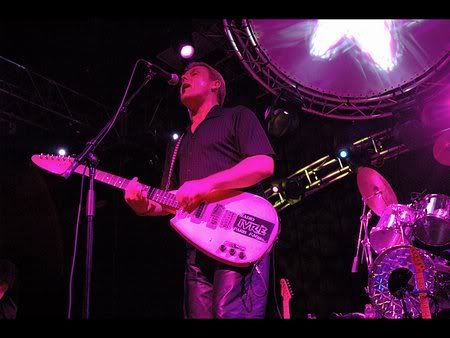
This is how the history of Dave Wakeling goes: The English Beat, General Public, solo career, then back to General Public, and then to bring it nicely full circle, back to the English Beat once more, which is where he currently resides.
Granted, the current incarnation of the band that’s touring North America at the moment isn’t quite the same as you remember it from the 1980s…Wakeling fronts the English Beat here, while Ranking Roger and Everett Morton are at the helm of the Beat in the UK, while Andy Cox and David Steele sit at home on piles of Fine Young Cannibals cash…but the moment the instant familiarity of Dave’s voice washes over you, you’ll most likely make the snap decision to just shut up and dance.
Popdose had the opportunity to chat with Mr. Wakeling not only about the past history and present state of the English Beat but about his entire career, making stops to check on the status of Saxa, to get a little bit of the lowdown on all three General Public albums, to find out why it took so long between the release of Wakeling’s first solo single (“She’s Having A Baby”) and the subsequent album (No Warning), and to see what he thinks about his former boss at IRS Records, Miles Copeland.
Popdose: Well, I know you’re on tour, but where are you at the moment?
Dave Wakeling: I’m in Calgary, in a carpark at a Best Western Hotel. It’s beautiful, and we’re just heading out in about an hour to the university, where we’ll play a show tonight. And then we’ve got a beautiful drive to Minneapolis.
Ah, very nice.
Yeah, 1,400 miles of very nice. (Laughs)
(Laughs) I hope you guys get along.
Yes!
So how’s the tour been going thus far?
The tour has been going absolutely fantastic. You know, you never want to tempt fate, but it feels like we’re on a bit of a roll, to be honest. The capacities are all bigger than last time, the reviews are better than last time, and just everything seems to be heading in a very positive direction. The new songs in the set are going down great, and people are lining up at the t-shirt stand, asking where they can buy a new CD, so I should say that everything’s heading in the direction of my dreams at the moment.
It certainly sounds as though it bodes well.
Yes!
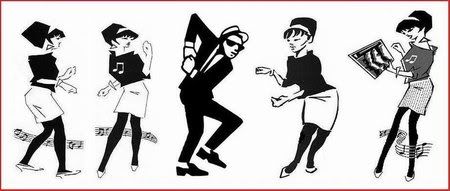
Well, the idea of the English Beat doing a 30th anniversary tour makes me feel old, so I can only imagine how it makes you feel. Or does playing music keep you feeling young?
Well, there is that as well. Thank heavens that there’s something timeless about music, and so that helps you get through the thinking about all the years. Luckily, I was drunk for half the time, so I don’t remember much of it. (Laughs)
Well, that does help.
It did at the time. Now, I’m happily and gratefully sober, so I can sort of appreciate a bit more of it whilst I’m actually doing it.
So when you do the set list, is it strictly English Beat stuff, or do you slip General Public stuff in as well?
Oh, yes. General Public songs are in there, and some new songs, and because Wayne, our bass player, is like a Two-Tone catalog, we can actually sometimes take requests from the floor and do a song that we haven’t played for year but Wayne knows the bass part to. And the keyboard player will pick it up by halfway through the second verse, and with a bit of luck, I’ll remember most of the lyrics. (Laughs) So we often throw a song or two in that we certainly weren’t intending to play!
Have you found that there are any songs that just don’t translate as well live as they used to?
No, in fact, the opposite. “I Confess” used to be a struggle, but now it’s effortless. Some songs just take 30 years to learn properly! No, we don’t really get stumped on any of them now.
I understand that you and Ranking Roger are on good terms, but how did it come to pass that you represent the Beat in the States and he represents the Beat in the UK?
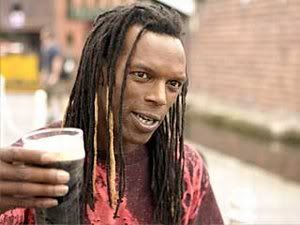
Well, we got together”¦Mojo Magazine, in England, wanted to put on a week of shows at the Royal Festival Hall, in London, and wanted to try and reunite groups for one more look at, like Camper Van Beethoven, Arthur Lee and Love, the Kinks, and one other I can’t remember were all featured during this week. And in the process of that week, we did a few warm-up shows to used to it, and Roger had been working with a band called Twist and Crawl, and we got there to do these local shows, and it would have “Twist and Crawl” in really small letters, and then “playing the songs of THE BEAT” in huge letters. And Roger was all embarrassed, and he said, “I’m not doing this on purpose, Dave, honestly, I’m not! It’s just that I get here, and it says “Ëœthe Beat,’ anyway, y’know?” And I said that I’d been through a very similar thing myself in America. I’d had a band called Bang that had been playing in the mid-“Ëœ90s, and I would get there and it would say, “Tonight: The English Beat, General Public, Bang, and Dave Wakeling.” As if it was four groups playing! And I had it in my contract, y’know, unless it was the way I said it had to be, they had to pay me, and I was allowed to go home without playing, and all sorts of rubbish. But none of it ever worked, because you get there, you’ve got a sold-out room and a line of people around the block, and then there’s me, jumping up and down and getting all upset about the marquee.
So I said, “Look, I’ve been through the same thing myself. Maybe after a certain number of years, you may lose the right to demand what the public call you. If you’re known in a certain way, then that’s perhaps who you are.” And I said, “I just got on with it. As long as you do great versions of the songs, then everybody goes home happy, and I don’t see as there’s any harm in it.” So that was the basis of it. I told him, “If you want to do shows as the Beat in English, that’s fine by me.” And the chaps from the Fine Young Cannibals (Andy Cox and David Steele) had given their blessing, also, so we all just moved ahead kind of positively. We had a bit of trouble later on. Somebody representing Roger tried to book him in America as the English Beat, and I was consciously not invited, and that caused some trouble. But we’re over that now. We’re not working together at the moment, but we both say, “Never say never.” Who knows what the future might bring? And in the meanwhile, we just wish each other the very best.
You mentioned the guys from the Fine Young Cannibals. Do you ever speak to Andy and Dave? I know they’ve not really been part of any of the reunions.
No, that’s right. We did speak a bit, especially when Warner Brothers had bought the catalog and were bringing out our best-of collection. We all had to get together and decide what songs would be on it. But I met with Andy and had a charming lunch at Kew Gardens in London, and we were all very pleased to find that, in fact, all of us were quite proud of our legacy of our songs from the Beat and very pleased that they’d stood the test of time and that they still meant quite a bit to a lot of people. And, so, yeah, there’s sort of a gentle pride of ownership in them at the moment.
So when you get together as a band like that, for legal wranglings or whatnot, is Saxa involved in that, or is it strictly the songwriters of the band?
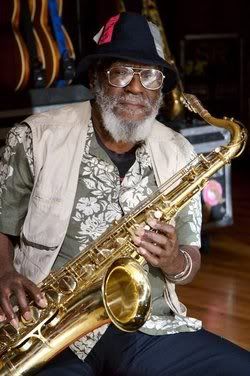
I saw Saxa three weeks ago when I was over visiting, and it would be impossible for Saxa to not be involved. (Laughs) You know, not just from a musical angle, but in many ways, he was our spiritual mentor. He taught us a fair bit about how to do music, but he also taught us an enormous amount about why you would do music, and what a responsibility it is towards the audience, who have put a lot of their time, effort, and money into coming and watching you play a song or buy a record, and what an honor that was to have them donate or dedicate their time to you. And you have a certain musical and spiritual responsibility to them. Those were very good lessons that we learned very early on, because we were, y’know, very nervous, very feckless youth. And Saxa was more seasoned and could put it in a wider perspective for us.
Actually, that was something I was wondering about. I know Saxa joined the band early on, right around the time of “Tears of a Clown.”
Exactly, yeah. About four days before we recorded it! (Laughs)
Well, I know he wasn’t necessarily what you’d call a matinee name, but in his own way, he had certainly added quite a lot to the Jamaican sound, working with Prince Buster, Desmond Dekker, and the like. How aware of his accomplishments were you, though?
Not at all in terms of his musical history. We just knew him as this amazing saxophone player that played down at my local pub, and he was spellbinding on a good night. He would start a solo, and the solo would just go on and on and on, and he would own the soul in the end. In fact, as he was going through the solo, the audience would forget what song it was at all! It had just become this wonderful piece of music, and it wasn’t until he finished and the singer would come back in that you’d go, “Oh, that’s right, that’s the song we were listening to!” (Laughs) And we soon found out that was the same with the Beat songs. He would go off on a tangent, and he’s a much more experienced musician than us, and he could tie us up in Moebius loops of rhythm and melody that we’d be staring at each other, going, “Where are we? Where are we in the song?” We didn’t know where! He’d cut across the beat so many times that he’d enslaved us; we were just following him in the same way that the audience was. We’d have to wait for him stop and nod and look at us”¦and laugh! And we’d have to quickly scramble back to where we were in the tune. (Laughs)
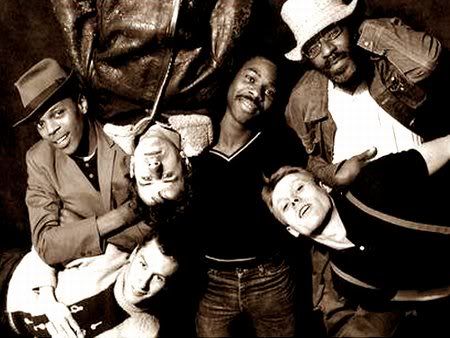
The Beat started off pretty big in the UK, but what were your hopes for America? I mean, you certainly ended up touring with enough big bands, but even most of them were still what you’d classify as alternative at the time.
Yeah, that’s right. It’s hard to explain or even understand myself now, but it all happened so quickly that it was all a bit tongue in cheek for us. You know, we did our first show on March 31st, 1979, and by Christmas, we were #6 in the charts and on the Christmas “Top of the Pops,” and all our best friends didn’t know whether to love us or hate us for it. And it had such a charmed feel about it. Like, the first person that we ever met that played any particular instrument, that was the person who joined the group. There were no auditions or anything like that. The whole thing fit together like a magical jigsaw puzzle. But we did say at the time, me and Andy, who’d been the first two to start it, that there was something kind of magical about the way this was starting up, and that if it ever lost its impetus, if all of a sudden it became incredibly hard work just to keep going, we should have the nerve and the decency to knock it on the head. We had the theory at the time that a lot of our favorite groups had carried on making LPs when they probably should’ve stopped, because some of the later LPs took away some of the shine from the first few. So when we got to that stage, thank heavens, we did have the nerve to call a halt on it. And me and Roger went off to do General Public, and Dave and Andy went off to do Fine Young Cannibals.
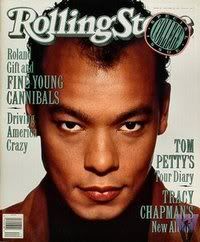
This may sound like a sideways question, but do you remember how you reacted the first time you heard Roland Gift?
Oh, yes. I was entirely cynical. I was as green as a dollar bill with jealousy. I remember exactly how I felt. I was very sarcastic about it, as I remember. I said that I preferred Al Green to Al Jolson. That was the quote that I used. And I would go clubbing or something, and if the DJ noticed me or recognized me in the crowd, they would have endless fun at putting “Johnny Come Home” or “She Drives Me Crazy” on as the next song and see if I’d dance to it or storm off in a hissy fit. And, so, I’d always dance through the song. I actually quite liked the songs as well, but I found it hard to admit that at the time. So I’d always dance through the song”¦and then leave the club and not come back. (Laughs) But I wouldn’t give them the satisfaction of seeing me storm off during the tune!
So how surprised were you when General Public pulled off a huge hit”¦well, relatively speaking, anyway”¦with “Tenderness“?
Well, I was surprised, but not really to do with the song. It was more to do with IRS Records at the time. It had been based on college radio and sort of underground promotion, and they had never really gotten involved with what at the time”¦and I suppose it’s only gotten worse, really”¦seemed like a very expensive top-40 lottery, where you had to be willing to commit a hundred thousand dollars just to even enter the competition of being in the charts. And IRS had never done that during the times of the English Beat. If you look at the history of IRS, you can see there’s a certain point right about the time when “Tenderness” came out, just before, where all of a sudden songs on IRS were starting to enter the top 40. And I think that they’d had enough success with the college charts and the independent charts that they could now afford to enter the top-40 lottery game. There had been jokes running around IRS that the only way you could get a top-40 hit on IRS was if you had a vagina. (Laughs)
Way to prove the cynics wrong, Dave.
Well, Miles liked his girl groups! But then it spread out. I remember that “Tenderness” first kind of broke in Boston on a top-40 radio station, and it spread across the country like wildfire at that point. And as it happened, I was stunned because the sales figures that we were seeing on a daily basis were now more than we’d sold in the previous week or, later, even in the previous month. It was an exponential success that a top-40 record brought at that time.
Something I’ve wondered about ever since reading the credits for All the Rage: what role did Mick Jones play in the history of General Public?

Well, we did a bit of a barter deal. He had left the Clash and was starting Big Audio Dynamite, and he said to me that he had a load of lyrics, but he liked the way I played with the vocal melodies, and if he gave me a cassette of instrumentals, would I do some la-la-la and humming and ideas for melodies? And he would fit his lyrics around those, if they fit. So I did that for him, and in the process of doing that, I said where we were with General Public, and he was my favorite guitarist of all time, and would he be willing to play on some of the tunes? So we gave him the songs as they were demos and let him get a feel for them. And we asked about rehearsals and that, but he was a very intuitive player, and he said, “No, I’ve got an idea of the songs now. Wait “Ëœtil you’ve got a finished song that’s begging for a lead guitar part, and I’ll just come down. I’m not precious about it. I’ll just play loads of things and you tell me what fits and throw away the rest.”
Although he had a very casual air about him, Mick was an incredibly hard-working musician. He would stay playing the guitar for hours and hours, searching as he played along with the track for what he thought resonated. And over the course of a few sessions, we got some of the most fantastic guitar parts for “Tenderness,” “Where’s the Line,” “Never You Done That, “Hot You’re Cool.” We got him mainly, I think, just to play on the songs that we thought might be potential singles or that had that smell of a hit about them. And then we let him pick some other songs that we played him, and he said, “Oh, yeah, I’ve got a part for that.” And we let him play on “As a Matter of Fact,” I think that was one of the ones he picked out.
I had to control Ranking Roger a bit, though, because”¦I wouldn’t say he was a control freak, but he had a very particular opinion about everything. So Mick Jones would be starting to play something, and Roger would be on the intercom straight away, “Uh, Mick, could you try something like”¦” And I could see Mick Jones start to get frustrated, y’know? I let it go on about two or three times, and then I thought, “Oh, no, this could spoil stuff.” So, eventually, Roger went to push the intercom button, and I grabbed his hand, and I said, “Here’s an idea, Roger: why don’t you let the best guitarist in the world play what he wants? And if, at the end of the night, you still don’t think you’ve got what you need, then come up with a suggestion. But as you can’t actually play the guitar, why not shut up?” (Laughs) And there was a tense little moment, but he let Mick Jones do his thing, thank God!
Were you surprised when General Public’s second album, Hand to Mouth, was not as big a success?

In a way. But not, in a way. We actually recorded it for a second time. The first time had been done with a lot of programming, and the programming was a bit stilted and stiff, and it didn’t really blend with the songs very well. A lot of people said, “Ah, it’s all right. Just stick it out and get on with the next one.” But it didn’t feel right and it didn’t sound right, so we recorded it again. And in those days, you had to have a record out every year, or else the crowd had moved on to another thing. So we took an extra year to record it and brought it out”¦and we left our audience waiting a bit too long. These were in the times of top-40 mass marketing, and you were either in the game or you were completely forgotten. And we just left it a bit too long. Because we’d been recording all that time, we hadn’t gone and toured, so we kind of left our fans waiting, hanging there a bit too long, and they’d moved on. And it was difficult, I think, playing the top-40 game to jump straight back in two years later. And the record company tried, and it didn’t work in the first few weeks, and, sadly, what happened in those days was that if they didn’t feel a bite at the end of the hook in the first month, then they just dropped your record and moved on to the next one. It was very cutthroat.
So it was kind of sad, because there were some really good songs on the record, but the process that we’d taken, and then the process that we had to commit ourselves to with the record company…? Now they were coming off the back of “Tenderness,” “Never You Done That,” and “Hot You’re Cool,” which had been top-40 hits, and it meant that they were going straight to top-40 with the new songs. They weren’t going to try and build it up through college or alternative radio. So they threw it at top 40 and it didn’t catch, so we dropped pretty quickly. So it was sad and a lesson to be learned, but you also have to be able to separate the making of music and the making of chart positions. They’re not the same thing. The people who had stayed with us as General Public fans liked the record, and they seemed happy with it. And although we hadn’t cast such a wide top-40 net and collected all of these other “Ëœ80s pop fans was sad in one way, we had to remember that it wasn’t the end of the world. As my mum put it to me, “There’s kids down the street, Dave, who’d give their right arm to play guitar in your band.” And I said, “Well, they wouldn’t be able to play much guitar with one arm, would they, mum?” (Laughs)
So had the album been a success, do you think you and Roger would’ve stuck it out as General Public for another album immediately thereafter, or were you already ready to call it a day?
No, unfortunately, the seeds of destruction had already been set during the process of the recording, because Roger”¦the record company hadn’t picked a lot of Roger’s songs to be on the album, and Roger had been upset by that and wanted to make a solo record. So all the way through making the album, we didn’t hear much else out of Roger except how he wanted to make a solo record. And it really got on everybody’s nerves and kicked the spirit right down, kind of. Then we went on a promotional tour, and I remember it was between Boston and Philadelphia, and he mentioned it again as we were taking off, just me and him. And my blood was kind of boiling. And as we were landing, I said, “Yeah, I think you’re right: I think you should make a solo record.” And he was getting all excited when I said, “”ËœCause that’s what I’m going to do.” And he said, “No! No, no, no, I don’t want to split the group up!” And I said, “Well, you just did.” (Laughs) Bad luck.
Well, I have to say that, as far as the third General Public album, Rub It Better, I’ve always been a big fan of “Hold It Deep” and could never figure out why that didn’t get released as a single.

Well, thank you very much for that, as I felt exactly the same way, and so did the top-40 guy from Sony. So also did the chap that was managing Madonna at the time: Freddy DeMann, who was running that record label she had. Maverick. And we nearly signed with Maverick. I can’t remember why we ended up with Sony. But he said that he thought that was the best song he’d heard in years, and that if we didn’t have a single, he’d convince Madonna to put it out as a single, and she’d have a number one with it! (Laughs) I thought it was the most obvious single, and I presumed it was going to be picked as one, so when Sony picked something else, I was shocked. And we went into Sony, and the top-40 guy was so mad about it that he”¦I don’t know how he did it, but on their internal computers, he got this message running across everybody’s computer in the whole building, saying, “It’s “ËœHold It Deep,’ stupid!” It was there for hours! So, yeah, I think that would’ve been a hit single myself.
Also, it was kind of insult to injury that it should have followed “Rainy Days” on the album, which was the single.
No, that didn’t help any. And thank you for bringing that up. (Laughs)
Whoops. Let me see if I can find some more salt to pour in the wound. (Pauses) Um, actually, this next one may actually prove to be just that, but”¦I’m a huge fan of your theme song for John Hughes’ “She’s Having a Baby.” It may not surprise you that, when my wife and I were having our first child, it was the lead track on the mix disc I made for us.
Ah, perfect, yes.
But what took so long for your actual solo album to come out? Because “She’s Having A Baby” was released in 1988, but it wasn’t until 1991 that No Warning finally emerged.

(Audible long inhale and exhale of breath) Well, uh”¦IRS Records said to me that they would be willing to sponsor quite a big recording deal for me, but they insisted that I came to Los Angeles to record, so they could keep an eye on me. And Miles Copeland at the time said that he wanted to do with me what he’d done with Sting, and that was that Sting had surrounded himself with players that he thought were better than him for his solo album, and it made him grow in his game and aspire to play as well as the people he’d surrounded himself with. So he said he wanted to do the same with me, and I was really flattered, y’know? So I came to Los Angeles and started meeting with people, and I’d put together a team of really well-respected session-type musicians who’d played on a load of great albums. And we rehearsed the songs and really felt it was a great vibe to it.
And I was managing myself, for better or worse…worse, probably!…so I went back to IRS, and we figured out our budget, and everything looked like it was all going to be happening, with Greg Ladanyi producing at George Massenburg’s studio, and everything was state of the art, with top-flight musicians. And I was really excited! And IRS, now with a few top-40 hits, had started to get involved in the movie business — which is often a mistake — and they’d sunk a load of money into some films, and the films weren’t doing anything, so they found themselves really short of cash. So they asked me to go back to Greg Ladanyi and these guys and see if they’d do the same record for less money. And I said, “Well, I don’t do this. You should talk them. I’m a singer.” And they said, “No, no, you go. You’ll get better out of them. You go ask them.” So I did. I was embarrassed, but I went and asked them, and they agreed. They said, yes, they’d do it on a lower budget. They’d have to cut some corners, we’d have to do some of the recording in the B-room rather than in the huge master suite, but it’d still be the same quality, so, yes, they’d do it.
So I was very pleased, and back to IRS with the good news. But Miles Copeland had just bought himself a chateau in the south of France that he was busy decorating in his inimitable style of late-“Ëœ50s Americana, so I had to wait until the news got to him in the south of France. And a week later, I was called in and they said, “Oh, yeah, we’re really pleased, but”¦could you go and ask them if they’ll do it for even less now?” I said, “No, this is distasteful! This is going to spoil the project before we’ve started! This is awful!” And they said, “Well, it is what it is. That’s what Miles wants you to do, so go and do it.” So I did. And they said, “No, we can’t do it for half again. It’s just not possible to do.” To be honest, there was another band who wanted to use the studio and their production services, and they said, “They don’t even have any songs, and they’re willing to offer double what you’re offering now at this point, just to come into the studio for three months and see if something happens.” So I lost that. And I was very sad.
Understandably so.
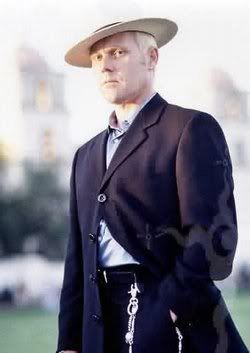
So I scrabbled around the budget that I’d gotten, and I found another producer that I thought was really good, who would do it with a mixture of programming and live recording. And that producer was Paul Fox, who went on to do a really wonderful XTC album (Oranges and Lemons). He was just starting up making a name for himself, and I was proud that I’d found him when I had. So we talked about it and got to know each other, went through the songs and felt comfortable that we could make a good record, and I went back to IRS with the good news. The news was relayed to Miles in his chateau, and his news came back a week later, and I wonder if you can guess what the news was.
Let me think”¦
“See if he can do it for less.” I’m, like, “Oh, no”¦” So I went and asked him if he could do it for less, and he said, “No,” and he went to do the XTC record, which was beautiful. So then I ended up with not enough budget to really make a record, and I’d wasted months languishing! And I’d written some songs with a guy named Mark Goldenberg, who had a great songwriting record, and I got on very well with him and written a couple of nice tunes. And with the money that was left, all that could be done was to program the songs up in his kitchen and try to overdub on top of it. But he wasn’t an accomplished programmer, and it didn’t quite work very well. And we struggled, and it was battling through a veil of tears. I was starting to feel as though IRS had promised me the earth and I’d come halfway “Ëœround the world and been given a bucket of dirt instead. Similar, but not quite the same thing! We got about halfway through it, and then I just gave up, frankly. I was, like, “No, this is nothing like what you promised me. I’m spending all day in the studio, trying to make things fit into this imperfect jigsaw puzzle, and then I go home and play the songs on my acoustic guitar and cry myself to sleep. I’m sick of it.” So I turned my back on you and pretended nothing ever happened. But about six, maybe nine months later, a friend of mine phoned me and said, “Oh, I hear you’ve got a new album coming out.”
Uh-oh.
I said, “I certainly do not.” And he said, “Well, you certainly do, because I have a CEMA number for it right here!” (Laughs) The guy worked at CEMA, and he said, “I have a number for it. It’s in the pipeline. You have a record coming out called No Warning. It comes out in a month!” And I went, “Oh, my God.” And it turned out that the half-finished tracks that IRS had got, they’d given them to another band, who owed them money, and said that if they finished this record off for them, they would forgive them their debt. It was”¦well, I wouldn’t mention their name, because I know how embarrassed they were about it.
We interrupt this interview for a brief sidebar…
It must be said that the identity of the band is no secret to anyone who owns No Warning. There’s a credit right on the back of the record which reads, “Additional recording and mixing by Derek Holt and Pete Haycock,” who at the time were playing together with Steve Hunter under the moniker of H Factor. Their lone release for IRS Records is an odd little album, notable less for its original songs – though those certainly aren’t bad – than for the trio’s odd selection of covers, including Squeeze’s “Tempted,” Re-Flex’s “The Politics of Dancing,” Wall of Voodoo’s “Mexican Radio,” and Richie Valens’ “La Bamba.” My personal recollection, however, was that it was for a very long time the only place you could find any version of “I Love You,” which Holt and Haycock originally made famous as members of The Climax Blues Band.
I checked with both Pete Haycock and Derek Holt to get their takes on the aforementioned credit on Wakeling’s album.
“I’m sorry, but I can’t really add anything to the story,” Holt replied. “I wasn’t aware of Dave’s album coming out without his knowledge, and our input was fairly minimum, as I remember. I never got a copy or received any payment for the work, either. I ran a studio for Miles for a while, and he used to send his artists to do stuff as a sort of ‘in-house’ arrangement. I never got involved in any of the dealings.”)
Haycock, however, had a bit more to say. “That era was rather “Ëœtrying.’ I recall,” he said. “I remember writing a movie score to “ËœOne False Move,’ only to discover that the composer’s money was apparently being split three ways. Derek, although he only pretended to twiddle a couple of knobs in Miles’ Stafford studio (and played one bit of organ which was eventually ditched from the movie), got one third. Terry Plumeri, whom I have never met to this day got the other third for arranging my themes for an New York session orchestra, despite the fact that Miles always insisted there was no money available for such extravagances. They get a 1/3 split of the PRS/GEMA/ASCAP money to this day, which pisses me off no end, as you can imagine. Hmmm…now the brain cells are warming up. I do remember being asked/told to play on Dave’s album, but I simply trusted those buggers then. That’s how it was if you were simply a musician who loved to play.”
And, now, back to your regularly scheduled interview…
Dave Wakeling: And, so, they finished up the record and put some really odd guitar parts on it. Some of the vocals were just the original demo vocals, some of those were just bits of la-la-la, some have got no vocals at all, and they just put a guitar solo there instead. (Laughs) And they brought the record out, and I tried to stop it. I found a litigator in New York, because certainly what IRS were doing was a breach of every contract or clause ever, and it would’ve been preventable, but at some point, the litigator said, “Look, here’s your options. You can take on a megalomaniac millionaire in a New York court for the next two years, and you’ll win, but you’ll be broke for the rest of your life. Or you could just put your head under a rock and cry for three months, then it’ll all be over and we’ll get you off IRS Records, because what they’re doing is a total breach of contract as well as being totally disgraceful morally, and you’ll never have to deal with them again.” And, so, I thought about it for a minute, and I said, “Okay, pass the rock!” (Laughs) And so we did that. I had nothing to do with the record, I didn’t promote the record, I didn’t do any interviews about it. I just pretended it wasn’t happening. And at least I was off of IRS Records”¦although the battle still ensues, because they haven’t paid any publishing monies since the early “Ëœ90s, like most groups that were on IRS. None of us have been paid for 15 years or more.

You know, by an odd coincidence”¦and I swear, it truly is coincidence”¦I will be speaking to Miles Copeland tomorrow.
(Sarcastically) Oh, jolly good. What about? Does he owe you money as well?
(Laughs) No, a friend of mine actually does publicity for his Bellydancing Superstars.
Oh, yes.
I’m actually focusing more on IRS Records, of course.
Oh, well, jolly good.
So if you have any comments for me to pass on, I’ll save them for, uh, probably the last moments of the interview.
Yeah: “Pay me.” (Laughs) That’s all. I mean, I adore him. He’s a scurrilous rogue, d’ya know what I mean? I always have a soft spot for him. I got on very well with his brother, Ian. We were close friends and kept in touch a lot. Even when I came and settled in Los Angeles, I used to go “Ëœround his house a lot. And we went through quite a lot of hard periods of our lives and consoled each other during that. I was very sad when he passed away, and I always got on very well with him.But I always found Miles a bit prickly and a bit shy. He kind of shouts a lot, as though he’s really strong, but he’s not. He’s a shy, retiring type, really. It’s all bluster. And behind all of that charade, he’s actually quite a sensitive and pleasant person. But he has to pretend to be a tough guy in so many ways that a lot of crimes get done in his name, really. A lot of artists who haven’t had the wherewithal to carry on like I have been very damaged by him”¦and he knows it, and he feels very guilty about it. Unfortunately, he just displays more bluster to try and cover it up, but he knows that he ruined the reputation of IRS Records by the cruelty that was done behind the scenes.
I did see that they’ve finally started to reissue some of the label’s albums digitally.
Well, they have, but do you know what’s interesting? They don’t actually have the rights to any of them anymore, “Ëœcause they changed all of the IRS company names. They changed all the companies out sometime in the “Ëœ90s, I think, and moved the business from America to England for whatever reasons you can guess. And they just stopped paying people. They changed the company names, and these new companies don’t actually have the rights to any of the songs. We just found that out recently, and they’ve offered to give us our catalog back”¦the General Public catalog”¦in exchange for not paying any of the money they’ve owed us for 15 years now. So I doubt”¦well, who knows whether they’ll be good for their word on it? But there has been quite a movement for perhaps all of the artists who’ve had their royalties stolen by IRS to all band together, really. But I suppose he’s clever enough to keep moving his money about, so that wherever you tried to get him to pay you, you’d find out there was no money in that account, and that it’d all be shifted somewhere else.
For him, I think that it’s a game. It’s a shame, really. Ian told me a lot of stories about him when they were growing up. Miles really seemed to be affected by being the eldest son of a CIA boss and kind of figured himself”¦that he was gonna be the Secretary of State one day. So he’s always had this sort of odd megalomania about him. But, y’know, I’m still happy when I see him. He’s a funny scurrilous rogue, and I find him amusing. He’s harmed me and a lot of other artists a great deal, but he’s kind of got his, because his name’s worth nothing in the business now. But as much as he tried to destroy many of the artists who were on his label, they’re still famous as legacy artists and he’s turned into a joke. So he got what he deserved. And now he’s happy with his bellydancers. (Laughs) Which is exactly what happened with IRS and the Top 40. He went back to what he knew: promoting things with vaginas!
(Laughs) And that would’ve been a great way to bring everything full circle if I didn’t have just one more question, so that we could close on a more upbeat note.
Sure!
I was just curious about who, over the years, were some of the most unlikely artists you’ve found yourself paired to play with.
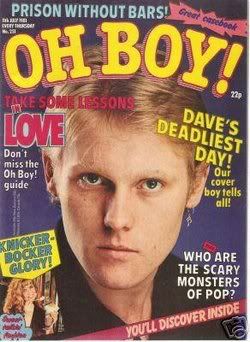
Hmmm. Well, we were always a bit careful about it, so we didn’t have too many bad ones. We were sort of much desired at the time, because we had a great danceable show but we didn’t try to steal anybody’s thunder. If they were the headliner band, we would just support the evening. So we were lucky. We got to play with the Police, the Clash, David Bowie, the Pretenders, Talking Heads. So we did rather well with the bands we worked with. R.E.M. opened up for us. We were very lucky, really.
I think the oddest thing that happened on tour was playing with the Clash at the Palladium in Los Angeles, and somebody came backstage and said, “Oh, we have a message from Bob Dylan. Could you put “ËœRobert Zimmerman +6′ on the guest list?” And I said, “You’re joking, aren’t you?” “No, seriously, could you put “ËœRobert Zimmerman +6′ on your guest list?” And I was, like, “Yes, of course we could.” So I wrote it out, I was all excited, and he came to the show and loved the band. We never got to meet him, but we heard that he loved the show. And it was two nights at the Palladium, and the same guy came back the next night and said, “Oh, we got another message from Bob Dylan. Could you put “ËœRobert Zimmerman +6′ again? “ËœCause they really enjoyed it.” So we said, “Yes, of course we could!” And we did, and he came to the show, and then even more exciting was that we heard that he left after three or four Clash songs. But he stayed for our set for both nights!
Two weeks later, we were in Minneapolis, where I believe Bob Dylan had a farmer somewhere in Minnesota”¦and I got the same message again! “Could you put “ËœRobert Zimmerman +6′ on the guest?” And I thought, “God, he needs to start buying some tickets, this guy! Or at least come and say hello!” But we did, and he came to the show again and enjoyed it. And we just thought it brought the band good luck! So”¦I think you’re allowed 20 people on the guest list, so if we ever had less than 14, I would just always round the guest list off with “ËœRobert Zimmerman +6,’ because you never knew when Bob Dylan might drop in. But if we had no guests at all, then it got silly, and we used to start adding “ËœWyatt Earp +7.’ Just in case he rode into town as well. They said you never knew when Wyatt Earp was going to show up, either. (Laughs)
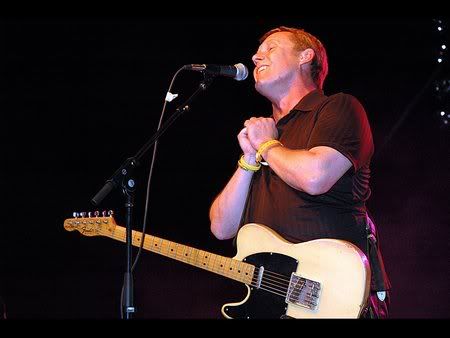
Well, it’s been a real pleasure talking to you, Dave.
Ah, yes, very nice, indeed. And an interesting set of questions, many of which I’ve never had to deal with before. I appreciate that!
Well, I try. But I’ve been listening to your stuff for long enough that I had a wide variety to choose from.
You did, indeed. Thank you very much for it!
ADDENDUM:
Let’s jump back to that sidebar piece for a moment, shall we?
When Pete Haycock responded to my E-mail about his experiences with IRS Records and working on Dave Wakeling’s record, he asked if I’d forward him Wakeling’s comments from the interview, in order to perhaps help shake away some of the cobwebs on his memory. I did so…and, man, it apparently served as the equivalent of a flamethrower on those cobwebs. It also served as an education for me, as I hadn’t been aware of the background of the aforementioned H Factor, which wasn’t nearly as much of a band as it appeared to be. Before offering up his response, however, I should note here – as I already did to Haycock – that Wakeling never made reference to H Factor nor its members by name during our conversation. He simply regaled me with the story of No Warning, and I’m the guilty party who brought their names into the proceedings…and, as I mentioned above, only did so because, well, they’re listed right on the back of the CD, anyway.
And, now, Mr. Haycock’s comments:
I am rather pissed off that David Wakeling should assume that I played on his record because H Factor or myself “owed” money to Miles Copeland or IRS!
(Extremely arrogant and incorrect crap, this, Davey Boy.)
They didn’t give it to the band to finish, either…’cos there was no band to give it to. H Factor was a name given by Miles to an extended CD version of a film score to “The Wedding Band,” so he could try to market it as a band. The film — also from IRS, of course — was crap, and the album was crap…simply “reloading” some old IRS Publishing/Illegal/Bugle-owned songs. I got a meagre session fee for playing on it after Derek and Steve Hunter had already programmed the tracks. I simply happened to be around in Stafford at the time when this DW subject came up; in fact, Derek and I both lived there at the time. The dingy little IRS studio which Derek “managed” was about ten minutes walk from my house.
At this point, you should maybe read again my brief description of the ‘One False Move’ score situation. This was typical IRS/Illegal/Bugle behaviour at the time. David should really have been a bit smarter. I was already shackled to Miles’ companies for years by then, but there is no excuse for being so easily beguiled by hints and suggestions about becoming the next “Sting”…or “flattered,” as the lad puts it. Hmmm…silly boy. Even though the Police made it big relatively fast, they certainly roughed it in the beginning and worked very hard indeed, touring in a Transit van without hotels, etcetera. In my humble opinion, The Beat were never as well received in the crucial markets, either, hence the name adjustment. Any road up.
I was told that this poor lad Dave had suddenly gone a bit weird and joined a Greenpeace crew off the coast of Antarctica, and he didn’t want to be in the music biz anymore, so could I please do some quick guitar parts so they could try to recoup their investment and thereby avoid having to sue him for walking out on the project? In other words, I was doing some nutter — who had previously made a bit of decent music — a favour, as far as I was concerned.
(Thanks for the comment about really odd guitar parts, then, Dave. They were some pretty f.cking odd tracks I was supposed to rescue for you, too, there, Matey Boy! As for the lack of royalties, welcome to the club, son! Except I actually sold a few of my IRS Guitar & Son albums to the guitar community and Climax Blues Band fans, but I’ve also received next to nowt from Miles and the gang in the last several years too. Just think yourself lucky that you got out of it so fast and so easily, David.)
Addendum, Part Deux:
Okay, I’d like to offer my apologies to Dave Wakeling. I got Pete Haycock’s additional comments at the last second…after the piece had originally been posted, in fact…and, although I had good intentions of dropping a line to Dave’s publicist to get his take on Pete’s latest comments, I hadn’t had a chance to do so before I received the following E-mail from Mr. Wakeling, which I will reproduce in its entirety in order to accept the public chastising within the opening lines, which I completely deserve:
great interview, thanks, although we all find it untoward that you would give pete haycock the final unanswered word in the way you did.
perhaps it was in hopes of obtaining my rejoinder, which of course is below, and i would appreciate it being added below petes telling and guilty comments?!
Dear Pete,
touched a nerve there did we?! yes, we have all been sucked in by miles copelands lies, but i at least I only harmed myself, whereas you transgressed one of the cardinal rules of musicianship by playing on another artists tunes uninvited, didn’t you?
i was told by irs staff that you had agreed to do it to be excused money you owed to miles, but whatever, the very fact that you did it at all condemns you, as you well know. they also told me you felt bad about it afterwards, and it seems like you still do, as you should.
as for your mock superiority, ” matey boy, silly boy, son” etc, it will take a bit more wit than that to cover your conscience; sounds like you’d had a few when you wrote to Will?
anyways, like many other Copeland victims, we struggle on, 14O shows a year, many sold out, double nights now in many towns, and new songs going down just as well as the old hits. only thing that takes the luster off it a bit is that at so many shows, around encore time, some rabid fan calls out for a “haycock classic” …! but, of course, you’re known as “Hey Dick” over here, as i’m sure you know.
we all make mistakes, and i forgive you for all of yours
cheers, and have one for me,
dave
x




Comments